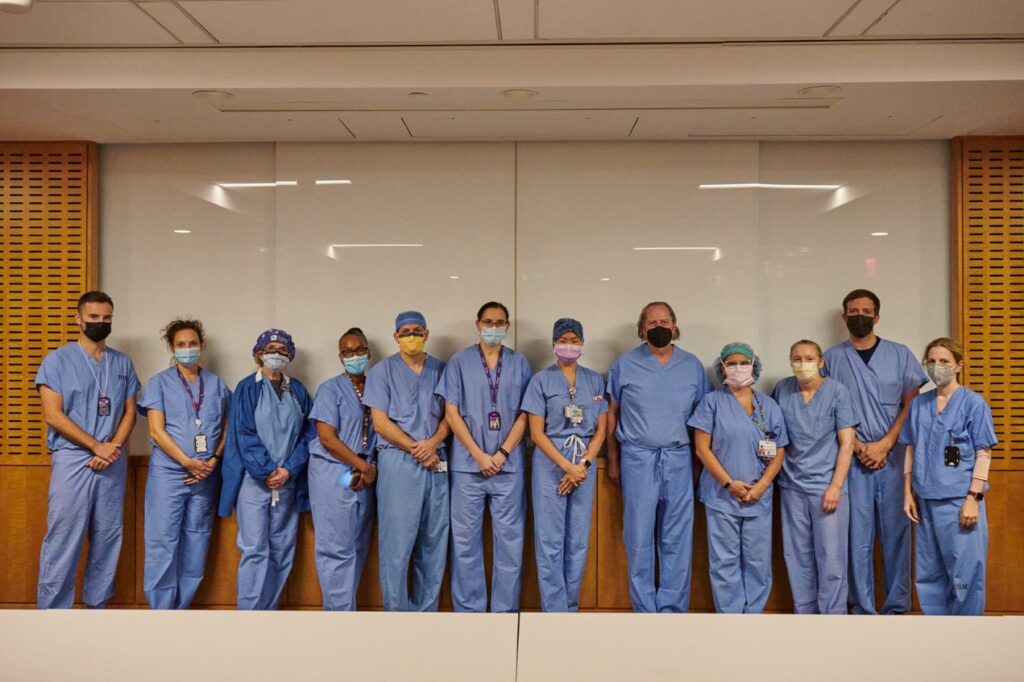A pig kidney has been transplanted into a person for the first time without causing rapid rejection by the recipient’s immune system, a potentially significant development that might ultimately help ease a critical scarcity of human organs for transplant.
The operation was performed at NYU Langone Health in New York City and entailed the use of a pig whose genes had been changed such that its tissues no longer carried a chemical known to induce an almost instantaneous rejection.
The first investigational transplant of a genetically engineered, nonhuman kidney to a human body was performed by NYU Langone’s Robert Montgomery, MD, DPhil, and his team.

The recipient was a brain-dead patient with signs of kidney dysfunction whose family consented to the experiment before she was due to be taken off life support, researchers told the Reuters news agency.
For three days, the new kidney was attached to her blood vessels and maintained outside her body, giving researchers access to it.
Test results of the transplanted kidney’s function “looked pretty normal,” said transplant surgeon Dr Robert Montgomery in a press conference, who led the study.
The kidney made “the amount of urine that you would expect” from a transplanted human kidney, he said, and there was no evidence of the vigorous, early rejection seen when unmodified pig kidneys are transplanted into non-human primates.
The recipient’s abnormal creatinine level – an indicator of poor kidney function – returned to normal after the transplant, Dr. Montgomery said.
According to Montgomery, a heart transplant recipient, the NYU kidney transplant experiment should pave the way for studies in patients with end-stage renal failure in the next year or two.
“It was the family’s wish for the decedent to be an organ donor, but due to mitigating factors the decedent’s organs were not suitable for donation,” said Montgomery, who himself is the recipient of a donated heart. “Instead, the family graciously approved donation of their loved one’s body for this procedure. That extraordinary generosity paved the way for this major step forward in creating a sustainable supply of life-saving organs and hopefully ending the current paradigm that someone has to die for someone to live.”
LiveOnNY, the nonprofit organization that facilitates organ and tissue donation in the greater New York City area, was a critical partner in the effort to obtain consent from the donor family and the prompt retrieval of the porcine organ, the researchers said in a statement.
“I applaud Dr. Montgomery and the entire NYU Langone transplant team for this incredible scientific achievement,” says Chad Ezzell, chief clinical officer of LiveOnNY. “We are entering a new era for our field and this will give new hope to those on our wait list as this important research moves forward. It is important to remember that none of this would be possible without the extraordinary donor and their family. We can never thank our families enough for the courage they show in saying yes to donation.”
The method may be tested as a short-term treatment for severely ill patients until a human kidney becomes available, or as a permanent graft in such studies.
The present study used a single transplant and the kidney was only left in place for three days, so any future studies are likely to reveal additional hurdles that will need to be addressed, according to Dr. Montgomery.
Patients with a low chance of getting a human kidney and/or a bad prognosis on dialysis would most likely be eligible.
Video: Dr. Robert Montgomery, the H. Leon Pachter, MD, Professor and chair of the Department of Surgery at NYU Langone and director of its Transplant Institute, performs the first xenotransplantation of a genetically engineered nonhuman kidney to a human at NYU Langone Health.
Credit: Joe Carrotta for NYU Langone Health
Read the press statement here.
A global media for the latest news, entertainment, music fashion, and more.




